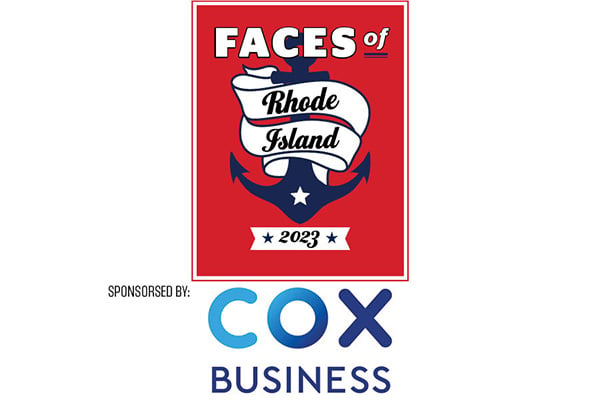Power of Attorney: An Inside Look at Rhode Island’s Attorney General Peter Neronha
With his penchant for political investigations and social media burns, Attorney General Peter Neronha is relishing his time in Rhode Island's political sandbox.

Attorney General Peter Neronha fights to keep political adversaries honest in Rhode Island. Photography by Wolf Matthewson
It was early January 2017 when Peter Neronha says he got an invite to lunch from Leo Skenyon, chief of staff and right-hand man to the then-most powerful Democrat in state politics, House Speaker Nicholas Mattiello.
Neronha was serving in his eighth year as Rhode Island’s top federal prosecutor under President Barack Obama. But Republican Donald Trump had just been elected president, so Neronha had begun thinking about his next career move and Skenyon knew Rhode Island Attorney General was on the table.
“It was a very odd conversation,” Neronha says during a recent five-hour interview at his South Main Street offices in Providence. He’s wearing a blue suit and blue tie, sitting comfortably in a windowless first-floor conference room at the center of the downtown building.
In the levels above, the state’s criminal division is abuzz with dozens of prosecutors who work on the thousands of criminal cases that his office charges each year. Next door is the civil division, which operates out of space renovated with the help of forfeiture money from Google — a settlement that happened under Neronha when he was a federal prosecutor.
Anyone in politics in 2017 knew that getting a call to meet with Skenyon typically meant the speaker had something to tell you. And Neronha felt like he got the message.
“It was pretty clear coming out of that lunch I was not Mattiello’s favorite candidate — let’s put it that way,” Neronha says.
Skenyon didn’t respond to a request for comment and Mattiello says he doesn’t remember the lunch. The former speaker declined to comment further, noting he’s left public office and is now
focused on his private law practice. But Neronha took notes during that day, and still keeps them on his iPhone under the title “Leo Skenyon.” They’re dated Jan. 9, 2017.
He scrolls through his notes to find the entry and holds them up to show they in fact exist in his phone. He doesn’t let me take his phone to look at them myself, but he reads from the notes, saying Skenyon told him he had poor name recognition, he wouldn’t be able to raise money and wouldn’t gain the backing of the Democratic Party.
“I went home, and I remember I read the notes to my wife and my wife said, ‘Oh, you’ve got to run now,’” Neronha says.
Today, Neronha can’t remember if the 2017 lunch was his “let’s run for attorney general” origin story. But after serving as a public prosecutor for two decades, it was a memorable introduction to the Rhode Island political sandbox where many elected officials like to play with sharp elbows, and Neronha decided he wanted a piece of the action.
He jumped in and won the office easily in 2018, running unopposed with the Democratic Party’s endorsement. He won a second, four-year term in 2022, and again wasn’t challenged in the Democratic primary.
Still, the meeting with the then-speaker’s top aide left a bad taste in his mouth, and Neronha says he and Mattiello didn’t get along much afterward. Over the next couple years, Neronha says the speaker messed with his legislative priorities and scooped millions out of his first-year budget.
On the flip side, Neronha launched a grand jury probe into the speaker — resulting in no charges — and tried a high-profile money laundering case against Mattiello’s former political aide, Jeff Britt.
Britt was acquitted, but not before Mattiello had to take the witness stand on live TV — a visual his political rivals pounced on and used in negative campaign ads. The speaker lost reelection to first-time candidate Barbara Ann Fenton-Fung a month later.
“Speaker Mattiello enjoyed power for power’s sake,” Neronha says. “That was not something that I found easy to work with.”
But the story of their relationship isn’t entirely unique when
examining the professional and political career of Peter Neronha, who repeatedly has proven to be a thorn in the side of other public officials.
Just ask those he’s investigated and ended up getting charged criminally, including former House Speaker Gordon Fox, former House Finance Committee Chairman Raymond Gallison, former Central Falls Mayor Charles Moreau, and three former North Providence town councilmen … the list goes on.
But his investigations don’t always end in criminal charges, which has frustrated some public officials over the years because even the existence of those probes can convict a politician in the court of public opinion. Currently, Neronha’s most complicated political relationship is with Rhode Island Governor Dan McKee, whose administration has been the subject of at least three high-profile investigations out of Neronha’s office.
None of those investigations have resulted in any charges, making the relationship fraught. Neronha openly blames McKee.
“Frankly, that’s on him — he resents the fact that we’ve done some investigations of him and his team and that’s clear — there’s nothing I can do about that,” Neronha says. “Plainly, he resents me for doing the work that I’m doing, and I guess I resent him for that.”
Neronha has become increasingly vocal in his criticism of McKee over the past two years, using X, formerly known as Twitter, to
express his discontent with McKee’s handle on a range of issues tied to health care, budgeting, the environment and leadership.
The criticism has heightened speculation that he’s mounting a run to oppose McKee for governor in 2026, as he’s currently term-limited as attorney general. Asked about it, he says it’s “doubtful” he will end up running. But he acknowledges he voted for McKee’s Democratic rival Helena Foulkes in 2022 and is open about not wanting to run against her if she’s in the race. Neronha acknowledges they talk often.
“I don’t think either one of us wants to run against the other,” he says. “I don’t want to be in a situation where us running against each other leads to a bad result.”
“Which would be what?” I ask.
“One of the two of us isn’t the governor,” he says.

Peter Neronha in his Providence office pictured with Kate Sabatini, chief of the office’s civil division (left) and Salvamarie Alifonso, his executive assistant. Photography by Wolf Matthewson
‘My wife was OK with it’
When Neronha was born in Jamestown in 1964, the population was barely 2,300 people and the best way to get to Newport was by ferry.
As it turns out, the Jamestown and Newport Ferry Co., which ran between the two seaside communities from the late 1800s until the Clairborne Pell Bridge opened in 1969, played an outsized role in the livelihood of the Neronha family.
Neronha’s grandfather, uncles and father worked on the ferry until the bridge opened. Neronha’s mother, a German immigrant, used it regularly after she came to Rhode Island in 1954.
“My mother met my father on the ferry going back and forth to visit her sister in Jamestown,” Neronha says.
Nearly a half-century later, the ferry would also help advance Neronha’s career.
In 2009, U.S. Senator Sheldon Whitehouse encouraged Neronha to submit his name for Rhode Island U.S. Attorney. Neronha, who was serving as an assistant federal prosecutor, was clearly Whitehouse’s pick. But that didn’t mean much without the backing of Whitehouse’s senior colleague, Senator Jack Reed, who didn’t know Neronha as well as Whitehouse — Neronha’s former boss.
“I didn’t know Senator Reed at all,” Neronha says. “I don’t think I’d ever met him.”
But Whitehouse says Neronha hit it out of the park during the interview process because he talked mostly about his family, their history coming to Rhode Island and their ties to the Jamestown-Newport ferry.
“That piece of genuine Rhode Island history really lit up Senator Reed’s appreciation for Peter,” Whitehouse says. “That flipped a switch when Jack understood his background, his family values and, of course, the Jamestown ferry.”
Neronha’s journey from being a Jamestown kid obsessed with reading and sailing boats to becoming the state’s top federal prosecutor, however, wasn’t exactly the path he’d mapped out when he was younger.
In fact, as a child he didn’t aspire to become a lawyer at all. Growing up on the island, Neronha says he barely knew what an attorney was outside of what he saw on TV or read in books.
“My father thought it would be a good idea, I guess because I argued with him a lot,” he quips.
Instead he spent his time at the library or hanging out with friends, including Liz Beretta-Perik, who today serves as the state’s Democratic Party chairwoman. She moved to the island when she was ten and says they “became instant friends.”
“He was an altar boy, and he said my brother and father had big heads, so he looked for the biggest heads in church to find me,” Beretta-Perik says, adding that her husband thinks Neronha’s sense of humor is most closely associated with the comedian-writer Larry David, who famously helped create the show “Seinfeld.”
“He was fresh then, too,” she says about their childhood. She remembers him always having a good sense of humor and being especially bright. Neronha says he liked to read books because it helped him explore and discover the world outside Jamestown without actually having to leave the island. Now he likes to travel and see new places across the globe, which he says wasn’t something his family did when he was a child.
Like most kids from Jamestown, Neronha went to high school in North Kingstown. But he didn’t start feeling drawn to law until he attended Boston College, where he graduated summa cum laude and then magna cum laude from the college’s law school. But ultimately, Neronha says his real legal training began when he was hired at the big-time Boston law firm Goodwin Procter LLP.
“You can’t learn in law school the skills you need to be a good lawyer in most disciplines,” Neronha says. “I remember when I got to Goodwin, and I’m sitting down and answering my first complaint against a client. Law school hadn’t really taught me how to answer a complaint.”
It was during this time he met his wife, Dr. Shelly Johnson, in the most unpredictable way. Neronha was very sick and ended up in the emergency room at Tufts Medical, where Johnson was doing her residency. She thought he had meningitis, so she gave him a spinal tap. He didn’t have meningitis at all, but Neronha didn’t hold the misdiagnosis against her.
“I was in love from the minute I saw her,” he says, adding that he later sent her a letter asking her out. “The rest is history.”
Neronha and Johnson — who’s now a South County physician — are celebrating thirty years of marriage this May. They raised two sons, Zach and Josh, who are both in their twenties now. Zach works for an airline company and Josh is following his mother’s footsteps into health care. Neither was interested in law, and Neronha says he never pushed them in any direction.
Boston ended up being as far afield as Neronha would go professionally. Johnson’s residency was ending and Neronha decided in 1996 he wanted to make his way back to Rhode Island, which also meant taking a massive pay cut.
He accepted a $33,000-per-year job as a line prosecutor under then Attorney General Jeffrey Pine. He was making $140,000 per year at Goodwin. Looking back, he’s convinced he made the right decision, and so started a more than two-decade public career
involving a slew of public corruption cases.
“My wife was OK with it,” he says about the money. “God bless her.”
Blind to politics vs. overtly political
Sitting in his South Main Street offices on a dreary January afternoon, Neronha’s hands are calmly clasped together for most of the hourslong conversation about his life and career. His arms go up in the air when he talks enthusiastically on a topic.

Political analyst Joe Fleming says Neronha “comes across almost as law enforcement more than a politician.” Photography by Wolf Matthewson
Lunch is from the Sandwich Hut, a popular Providence sandwich shop and favorite of his staff. He prefers Italian Corner in East Providence but says he doesn’t go there much anymore. He was turned onto the shop by Jim Martin, a longtime spokesperson for the Rhode Island U.S. Attorney’s Office.
“I can’t get there because of the Washington Bridge,” he says, referencing the I-195 bridge that shuttered unexpectedly in December and has since ensnared traffic in the area.
Neronha is voluble when talking about issues he’s passionate about, such as the future of health care. He’s worried about hospital finances and predicts multiple closures in the coming years if nothing is done about it. The conversation gets so dynamic throughout the course of the day that neither of us end up eating our sandwiches.
But Neronha is calm when he talks about the public corruption cases he’s worked on over the years. One of the first that jumps to mind is Jonathan Oster, the former Lincoln town administrator who Neronha and others investigated in the early 2000s and eventually charged with bribery. “We got information that Oster was shaking down developers,” Neronha says.
A wiretap helped investigators flip a middleman, who then
delivered a controlled $25,000 bribe to Oster. He was arrested and killed himself a day after he was convicted. “It was pretty shocking to everyone,” he says, his eyes becoming slightly unfocused as he remembers it.
As a prosecutor in the attorney general’s office, he worked on some of the state’s bigger public corruption cases, including the arrest of conspirators who planned a failed plot to bribe former House Speaker John Harwood. The bribe never happened and the speaker was never implicated in the scheme.
The cases helped Neronha get a foot in the door at the U.S.
Attorney’s office, where he was hired as an assistant federal prosecutor in 2002. Looking back, Neronha says he loved that job and would have happily retired from it had he not become U.S. Attorney and then attorney general.
He helped take down former House Speaker Gordon Fox for stealing campaign contributions and accepting a liquor license bribe. Former House Finance Chairman Raymond Gallison went to prison for stealing funds from a dead man’s estate and from a trust fund set up for a person with developmental disabilities.
Former Central Falls Mayor Charles Moreau got caught taking a bribe, and three North Providence town councilmen, including the council president, were nabbed in 2010 for extorting and
accepting a bribe.
Despite them all being politicians, Neronha says he never thought much about politics when he conducted his investigations, even as they left behind a trail of disruption and shift in power dynamics.
Fox’s fall led to Mattiello’s rise. Representative Marvin Abney replaced Gallison. James Diossa won in a special election to replace Moreau. He now serves as the state’s general treasurer.
“The politics didn’t matter to me,” Neronha says, although he doesn’t miss an opportunity to point out his work created a
political domino effect that elevated Mattiello and Diossa. “I was not a politically experienced person. I didn’t know these players. I’d never met Fox.”
On the one hand, the high-profile investigations have won him political points with voters over the years, says longtime pollster and political analyst Joe Fleming.
“In the jobs he’s had, he’s stayed above the political fray because he might have to investigate elected officials,” Fleming says. “That’s what people like about him. He comes across almost as law
enforcement more than a politician.”
Yet while it’s fairly clear-cut that a politician has behaved badly when they plead guilty to crimes such as bribery, it’s trickier when an investigation becomes public but doesn’t result in criminal charges. In those instances, law enforcement doesn’t typically talk about what they examined, what they discovered — or not — and why they decided not to file charges. And the lack of transparency often leads to conjecture and rumor, which are like chum in the waters of politics. They feed into rumor mills and hang over the head of politicians — sometimes for years.
Just take Mattiello, who was lambasted by his political opponents over Neronha’s probes, despite never being charged for anything. And the imagery of him testifying during the Britt trial — an issue that stemmed from Mattiello’s 2016 election — may have tipped the scales of people going to the polls in 2020.
“The trial was bad for him” says Britt, who works as a State House lobbyist and influential political operative. “The visual and the testimony just wasn’t something people wanted to vote for.”
Fast-forward to now. McKee is clearly perturbed by public criticism directed toward him that stems from Neronha’s investigations into his administration, a dynamic that only becomes more political when considering Neronha’s future and what role he might play in the upcoming gubernatorial race in 2026.
And Neronha has been successful in amplifying everything he does with the use of his favorite social media platform, X. He regularly writes posts to chastise other public officials, sound off on his favorite issues and even go after individuals — including a sitting judge — over everything from petty disagreements to big-picture issues he sees as systemic failures.
Neronha defends his use of X — which Boston Globe columnist Dan McGowan described as troll-like — saying his postings draw attention to issues he argues would otherwise go unnoticed. But his biggest critics liken the behavior to former President Trump, who relied on the same platform to amplify his messaging, and some go so far as to accuse him of using his office to influence politics.
“Where I think he’s been a very big disappointment is the overtly political nature of his office,” says Charles “Chas” Calenda, a Republican who ran unsuccessfully against Neronha in 2022. “Your politics shouldn’t be driving whether cases are being prosecuted or not prosecuted and I think he’s turned into someone that nobody seemed to know when he first took office.”
‘The governor has a long memory’
Neronha says he tried to bury the hatchet with McKee.
The two men met in January for breakfast at the West Side Diner in Providence, where Neronha says he suggested that they look past the last couple years, and move forward with a clean slate. Neronha says McKee didn’t seem interested.
“I just don’t think that he is prepared to do that because I think that the governor has a long memory when he perceives that he has been wronged,” Neronha says.
McKee declined to be interviewed for this story, but in a statement issued through a spokesperson he downplayed the idea that his relationship with Neronha is contentious.
“As the governor has said, he and the attorney general have a professional relationship,” spokesperson Olivia DaRocha says. “The governor and attorney general did have breakfast. The governor felt it was a productive and professional exchange and he left the meeting understanding that they would continue to have a professional relationship that’s in the best interest of the people of Rhode Island.”
Neronha says the animosity stems from investigations his office has conducted into the McKee administration, including a 2021 probe into a controversial land deal involving McKee’s former chief of staff, Tony Silva. It ended in no charges.
Neronha also investigated Walter “Bud” Craddock, McKee’s head of the R.I. Division of Motor Vehicles, after Cranston police discovered an illegal sex-for-sale business operating out of a massage parlor in one of Craddock’s rental properties in 2021. It also ended with no charges.
The probes could be seen as self-inflicted wounds for McKee, who called for both the Silva and Craddock investigations. But the attorney general says he thinks the governor doesn’t like how they were carried out and how they reflected negatively on his administration, which he argues isn’t his fault.
“If he were to take an honest look in the mirror, he would understand why we have a job to do regardless of how it turns out,” Neronha says.
The biggest elephant in the room, however, is likely Neronha’s investigation into the ILO Group, an education consulting firm run by former business associates of McKee’s close friend and adviser, Michael Magee. The firm incorporated in 2021 just days after McKee was sworn into office, and his administration promptly awarded ILO Group a lucrative state contract valued at $5 million.
McKee has vehemently denied anything untoward happened with the contract and how it was awarded. But it hurt him politically and that became amplified when the FBI and Rhode Island U.S. Attorney’s Office feds got involved.
“I believe that he resents the fact that the feds are involved, and he attributes their involvement to me,” Neronha says. “What I’ve said to him directly is: ‘If you think the feds were not going to take a look at a project or a contract that involves federal money, then you just don’t understand how that office works.’”
Like the Britt trial hurt Mattiello in 2020, the ILO investigation became political fodder in the 2022 primary election for McKee’s Democratic rivals, including former CVS executive Helena Foulkes.
“Once again, Dan McKee has shown that he cares more about enriching his well-connected friends than serving the people of our state. How can Rhode Islanders possibly trust him now?” Foulkes said at the time.
McKee squeezed out a primary victory, narrowly defeating Foulkes, and went on to win the general election easily. But Foulkes is signaling a rematch against McKee in 2026. And while Neronha has also expressed interest in the job, he sounds more interested in someone other than McKee doing it.
“Rhode Island needs a really strong team at the top to get where it needs to be,” Neronha says. “I’m not saying that this governor can’t get us there, but I’m worried in a couple sectors in particular: energy, environment, climate and health care … I’m worried that we’re not moving fast enough.”
Another reason it’s unlikely Neronha will run for governor: He’s been battling a severe back condition. A pocket of fluid was dissecting his spinal cord, and a surgery last year prevented him from sailing.
Neronha’s on the mend, but doesn’t sound too confident, saying a recent MRI revealed he might need more surgery.
“If I was ten years younger, regardless of who the governor was, more politics might be in my future,” Neronha says. “When I’m done here, I’ll be sixty-three. And the question is: How do I want to spend my sixties?”
It’s hard to believe him when he says politics might not be in his future. Right or wrong, his track record shows he doesn’t like to sit on the sidelines when the issues at hand are in his wheelhouse. What role he’ll end up playing? Only Neronha knows the answer.

































